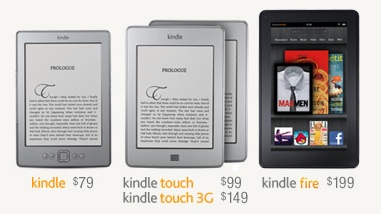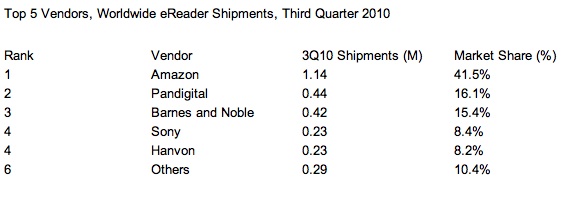 If you follow the tech industry in any shape or fashion, you will have heard by that now Amazon, the king of eReaders, has just launched a new flagship eReader called the Kindle Fire. Unlike most news sites who think the Kindle Fire is meant to compete with Apple and the iPad, I see it as a different product. First, it’s not a true tablet. You can’t access the Android Market (only Amazon’s), it lacks 3G, lacks cameras, calendars, mail apps, and is not meant for creating content. Instead, it’s meant for consuming Amazon products like the Kindle bookstore and Amazon video, hence the $199 price point. However, the focus of this story is not the Kindle Fire and is instead what the Kindle Fire has done to the rest of the Kindle family. Amazon has now dropped the base Kindle to $79, the Kindle Touch to $99, and the Kindle Touch 3G to $149. This makes the Kindle family the cheapest it has ever been and far lower than the price of the Nook Wi-Fi ($139), Nook Color $249 and Sony Reader Wi-Fi $139. Now one small disclaimer to note from the Amazon price point is that all of the given prices are for their ad-enabled devices which will periodically place ads on your screen. If you want that feature gone, you will have to fork over an extra $30-40 on each device.
If you follow the tech industry in any shape or fashion, you will have heard by that now Amazon, the king of eReaders, has just launched a new flagship eReader called the Kindle Fire. Unlike most news sites who think the Kindle Fire is meant to compete with Apple and the iPad, I see it as a different product. First, it’s not a true tablet. You can’t access the Android Market (only Amazon’s), it lacks 3G, lacks cameras, calendars, mail apps, and is not meant for creating content. Instead, it’s meant for consuming Amazon products like the Kindle bookstore and Amazon video, hence the $199 price point. However, the focus of this story is not the Kindle Fire and is instead what the Kindle Fire has done to the rest of the Kindle family. Amazon has now dropped the base Kindle to $79, the Kindle Touch to $99, and the Kindle Touch 3G to $149. This makes the Kindle family the cheapest it has ever been and far lower than the price of the Nook Wi-Fi ($139), Nook Color $249 and Sony Reader Wi-Fi $139. Now one small disclaimer to note from the Amazon price point is that all of the given prices are for their ad-enabled devices which will periodically place ads on your screen. If you want that feature gone, you will have to fork over an extra $30-40 on each device.

This puts Sony at an odd intersection where it’s frankly been from the inception of their eReader products called the Sony Reader. Like many Sony products, they tend to have a higher price point than competing devices. Generally, the premium tends to be for extra features and quality which I will attest to, by all means, the Sony Reader Wi-Fi is superior to the Kindle and Kindle Touch. With a price twice as much as the Kindle, will consumers really care about the advanced Dual Touch technology or that it’s the world’s lightest eReader? The easy answer to that is to ask your friends who own eReaders to reveal their device brand.
Now, one could argue that Apple is the counter example to all of this. They make better computers and iPods, charge more for them and plenty people still buy their products. However, I think that this information is outdated, especially if we consider that the iPhone 3GS can be purchased for $49 and the iPhone 4 is priced at $199, same as most competing and new smartphones. The iPad had yet to have a serious competitor, mostly due to the lack of Android quality when it comes to tablets, but also because no company has been able to offer a price point that Apple is. Part of the reason Apple can sell the iPad at $499 is due to their vertical integration where they create the software and hardware and sell mainly through their own stores which reduces a lot of access costs that other companies have to face. But even if we were to take the argument that Apple sells more expensive products, which are better in quality than their competitors’, something that Sony reaches for as well, why is it that Apple can push large volumes into consumer hands and Sony is not?

The simple answer is lack of product awareness from Sony. When Apple makes a product, the whole world knows, due to their impressive advertising strength. But let’s again say Apple is a unique company and an outlier in this circumstance, which brings us back to the Kindle. Now Amazon, who has millions of shoppers everyday on their online store, is able to captivate them by placing the Kindle front and center of their home screen. The Nook is able to capture audiences through their Barnes & Noble stores and both companies offer a lower price point than Sony. In the case of the Kindle which sits as the king of eReaders (unless we take tablets into account, in which case Apple becomes the number one seller), not only does Amazon offer a lower-priced entry model, but also backs the device with a marketing campaign.
All of this begs the question: Why is Sony even in this market? If they believe they have a superior product to the Kindle, which I believe they do, then fine, stay in the market. However, don’t think that by just offering a superior product which only those who read a site like ours or Engadget will be enough to win over the consumer who will see an ad for the Kindle once a day and find the price point to be half of your model in stores to choose a Sony product and not another brand. In the current state of the tech industry where anybody can make a name for themselves and consumers who are knowledge-savvy and price-aware, don’t think that by just releasing a product with a press release will do anything but collect dust on store shelves. Anybody remember the Sony Tablet S that was released 2 weeks ago? Neither do I, because I’ve yet to see a single advertisement or marketing campaign outside of Twitter and Facebook.
Discuss:
Should Sony continue to stick in the eReader market or is it time for an exit? If they should stick around, what should they do differently?

You must be logged in to post a comment.